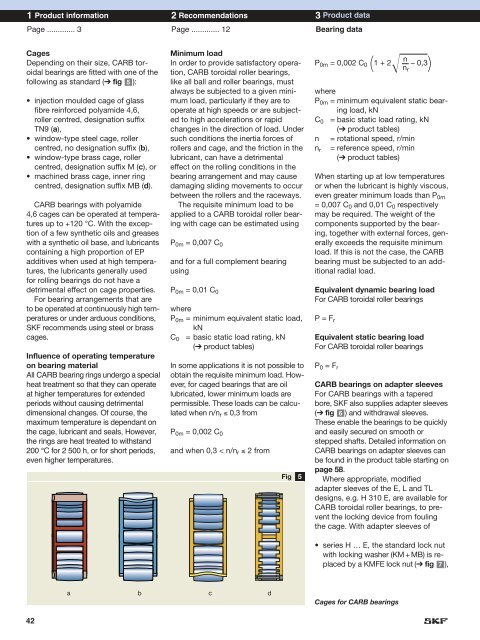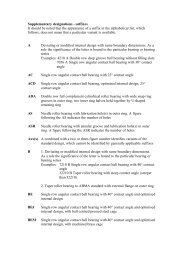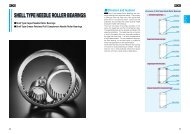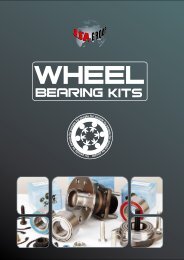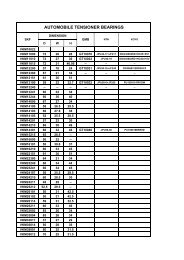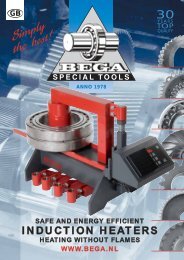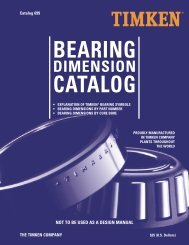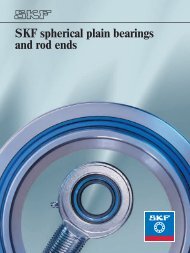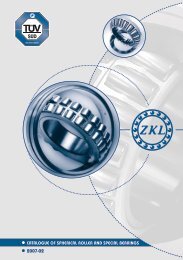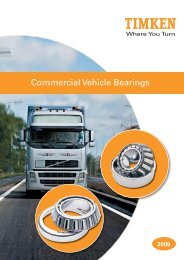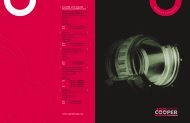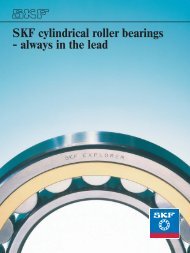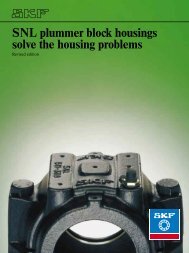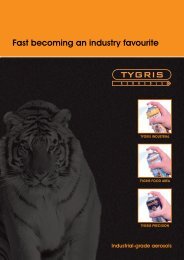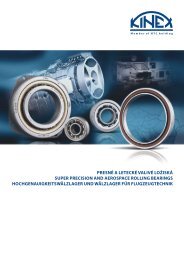CARB® toroidal roller bearings â a revolutionary ... - Acorn Bearings
CARB® toroidal roller bearings â a revolutionary ... - Acorn Bearings
CARB® toroidal roller bearings â a revolutionary ... - Acorn Bearings
Create successful ePaper yourself
Turn your PDF publications into a flip-book with our unique Google optimized e-Paper software.
1 Product information 2 Recommendations 3 Product data<br />
Page ............. 3 Page ............. 12 Bearing data<br />
Cages<br />
Depending on their size, CARB <strong>toroidal</strong><br />
<strong>bearings</strong> are fitted with one of the<br />
following as standard (➔ fig 5 ):<br />
• injection moulded cage of glass<br />
fibre reinforced polyamide 4,6,<br />
<strong>roller</strong> centred, designation suffix<br />
TN9 (a),<br />
• window-type steel cage, <strong>roller</strong><br />
centred, no designation suffix (b),<br />
• window-type brass cage, <strong>roller</strong><br />
centred, designation suffix M (c), or<br />
• machined brass cage, inner ring<br />
centred, designation suffix MB (d).<br />
CARB <strong>bearings</strong> with polyamide<br />
4,6 cages can be operated at temperatures<br />
up to +120 °C. With the exception<br />
of a few synthetic oils and greases<br />
with a synthetic oil base, and lubricants<br />
containing a high proportion of EP<br />
additives when used at high temperatures,<br />
the lubricants generally used<br />
for rolling <strong>bearings</strong> do not have a<br />
detrimental effect on cage properties.<br />
For bearing arrangements that are<br />
to be operated at continuously high temperatures<br />
or under arduous conditions,<br />
SKF recommends using steel or brass<br />
cages.<br />
Influence of operating temperature<br />
on bearing material<br />
All CARB bearing rings undergo a special<br />
heat treatment so that they can operate<br />
at higher temperatures for extended<br />
periods without causing detrimental<br />
dimensional changes. Of course, the<br />
maximum temperature is dependant on<br />
the cage, lubricant and seals, However,<br />
the rings are heat treated to withstand<br />
200 °C for 2 500 h, or for short periods,<br />
even higher temperatures.<br />
Minimum load<br />
In order to provide satisfactory operation,<br />
CARB <strong>toroidal</strong> <strong>roller</strong> <strong>bearings</strong>,<br />
like all ball and <strong>roller</strong> <strong>bearings</strong>, must<br />
always be subjected to a given minimum<br />
load, particularly if they are to<br />
operate at high speeds or are subjected<br />
to high accelerations or rapid<br />
changes in the direction of load. Under<br />
such conditions the inertia forces of<br />
<strong>roller</strong>s and cage, and the friction in the<br />
lubricant, can have a detrimental<br />
effect on the rolling conditions in the<br />
bearing arrangement and may cause<br />
damaging sliding movements to occur<br />
between the <strong>roller</strong>s and the raceways.<br />
The requisite minimum load to be<br />
applied to a CARB <strong>toroidal</strong> <strong>roller</strong> bearing<br />
with cage can be estimated using<br />
P 0m = 0,007 C 0<br />
and for a full complement bearing<br />
using<br />
P 0m = 0,01 C 0<br />
where<br />
P 0m = minimum equivalent static load,<br />
kN<br />
C 0 = basic static load rating, kN<br />
(➔ product tables)<br />
In some applications it is not possible to<br />
obtain the requisite minimum load. However,<br />
for caged <strong>bearings</strong> that are oil<br />
lubricated, lower minimum loads are<br />
permissible. These loads can be calculated<br />
when n/n r ≤ 0,3 from<br />
P 0m = 0,002 C 0<br />
and when 0,3 < n/n r ≤ 2 from<br />
Fig<br />
5<br />
P<br />
n<br />
0m = 0,002 C 0 ( 1 + 2 n – 0,3 r<br />
)<br />
where<br />
P 0m = minimum equivalent static bearing<br />
load, kN<br />
C 0 = basic static load rating, kN<br />
(➔ product tables)<br />
n = rotational speed, r/min<br />
n r = reference speed, r/min<br />
(➔ product tables)<br />
When starting up at low temperatures<br />
or when the lubricant is highly viscous,<br />
even greater minimum loads than P 0m<br />
= 0,007 C 0 and 0,01 C 0 respectively<br />
may be required. The weight of the<br />
components supported by the bearing,<br />
together with external forces, generally<br />
exceeds the requisite minimum<br />
load. If this is not the case, the CARB<br />
bearing must be subjected to an additional<br />
radial load.<br />
Equivalent dynamic bearing load<br />
For CARB <strong>toroidal</strong> <strong>roller</strong> <strong>bearings</strong><br />
P = F r<br />
Equivalent static bearing load<br />
For CARB <strong>toroidal</strong> <strong>roller</strong> <strong>bearings</strong><br />
P 0 = F r<br />
CARB <strong>bearings</strong> on adapter sleeves<br />
For CARB <strong>bearings</strong> with a tapered<br />
bore, SKF also supplies adapter sleeves<br />
(➔ fig 6 ) and withdrawal sleeves.<br />
These enable the <strong>bearings</strong> to be quickly<br />
and easily secured on smooth or<br />
stepped shafts. Detailed information on<br />
CARB <strong>bearings</strong> on adapter sleeves can<br />
be found in the product table starting on<br />
page 58.<br />
Where appropriate, modified<br />
adapter sleeves of the E, L and TL<br />
designs, e.g. H 310 E, are available for<br />
CARB <strong>toroidal</strong> <strong>roller</strong> <strong>bearings</strong>, to prevent<br />
the locking device from fouling<br />
the cage. With adapter sleeves of<br />
• series H … E, the standard lock nut<br />
with locking washer (KM + MB) is replaced<br />
by a KMFE lock nut (➔ fig 7 ),<br />
a b c d<br />
Cages for CARB <strong>bearings</strong><br />
42


